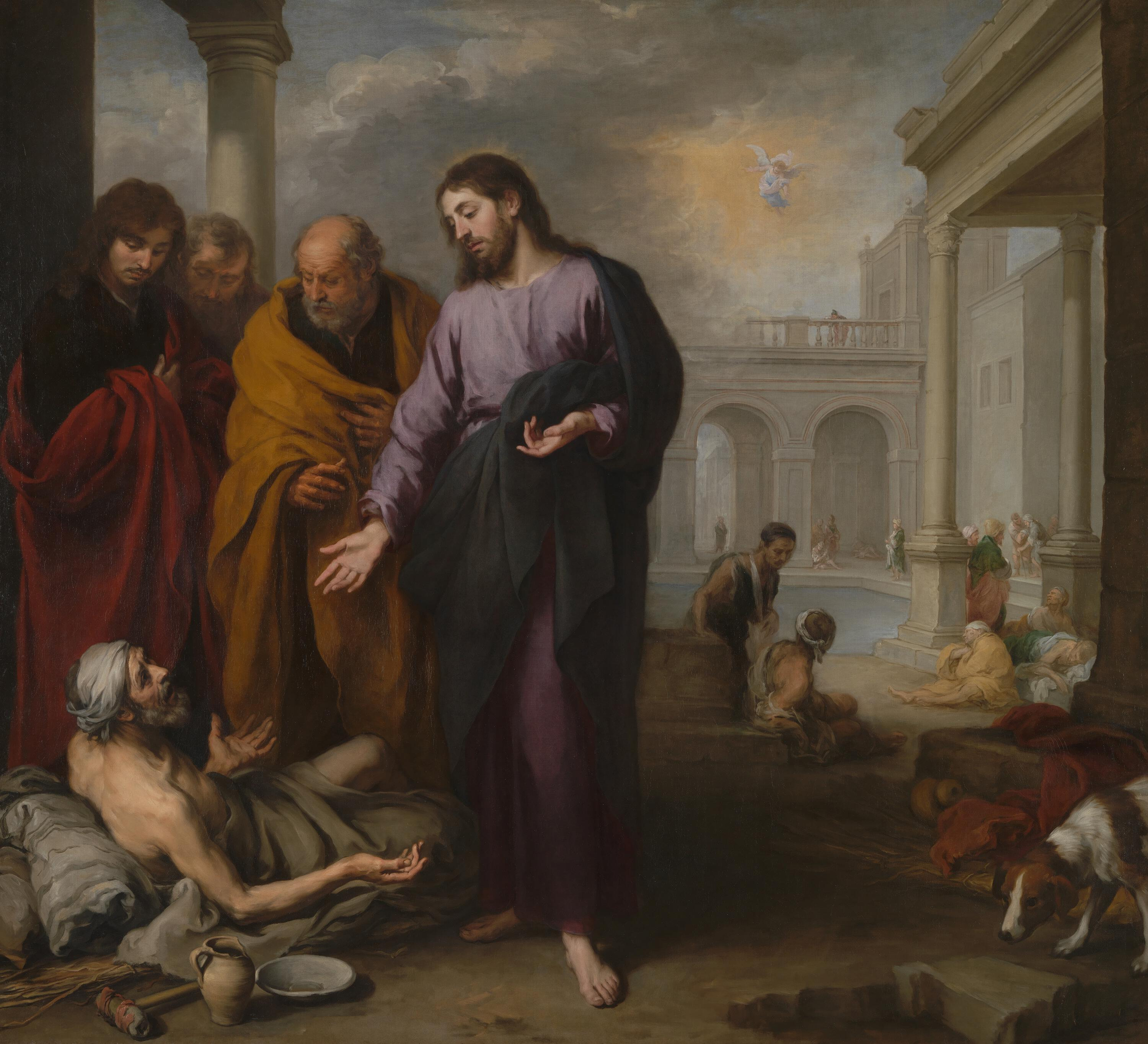 Christ Healing the Paralytic at the Pool of Bethesda by Bartolome Esteban MurilloIn the heart of Jerusalem, near the Sheep Gate, lies a pool known in Hebrew as Bethesda, surrounded by five porticoes. This site, steeped in history and significance, serves as the backdrop for a profound encounter between Jesus and a man who had been afflicted with illness for thirty-eight years. The narrative unfolds as a testament to Jesus' compassion and power to bring about miraculous healing.
Christ Healing the Paralytic at the Pool of Bethesda by Bartolome Esteban MurilloIn the heart of Jerusalem, near the Sheep Gate, lies a pool known in Hebrew as Bethesda, surrounded by five porticoes. This site, steeped in history and significance, serves as the backdrop for a profound encounter between Jesus and a man who had been afflicted with illness for thirty-eight years. The narrative unfolds as a testament to Jesus' compassion and power to bring about miraculous healing.
The scene is set with a description of the pool of Bethesda, where a multitude of individuals suffering from various ailments – the ill, blind, lame, and crippled – gather in hope of receiving healing. Among them is a man who has languished in illness for nearly four decades, his life marked by suffering and despair.
Jesus, in his divine wisdom and compassion, approaches the man and engages him in a simple yet profound question: "Do you want to be well?" This inquiry goes beyond the surface level of physical healing; it delves into the depths of the man's desire for restoration and transformation.
The man, in his response, reveals the obstacles that have hindered him from receiving healing – the lack of assistance to lower him into the pool when its waters are stirred, believed to possess healing properties. His words resonate with a sense of resignation and hopelessness, reflecting the struggles faced by many who grapple with illness and adversity.
Undeterred by the man's circumstances, Jesus issues a command that transcends the limitations of human understanding and medical science: "Rise, take up your mat, and walk." In an instant, the man experiences a miraculous transformation as he is empowered to rise from his mat, an act symbolizing not only physical restoration but also newfound freedom and wholeness.
The immediacy of the man's healing underscores the divine authority and power vested in Jesus, who demonstrates his ability to bring about radical transformation in the lives of those who encounter him. The man, now healed, takes up his mat and walks, a living testimony to the miraculous touch of Jesus' compassion and grace.
The healing at the Pool of Bethesda serves as a poignant reminder of Jesus' unwavering compassion for the suffering and marginalized. It challenges us to examine our own attitudes towards those who are afflicted and marginalized, prompting us to extend compassion, empathy, and tangible support to those in need.
Moreover, this narrative invites us to reflect on the transformative power of encountering Jesus in our own lives. Like the man at Bethesda, we are called to respond to Jesus' invitation to wholeness and restoration, trusting in his divine ability to bring about healing and renewal in every aspect of our lives.
As we contemplate the healing at the Pool of Bethesda, may we be inspired to embody Jesus' compassion and grace in our interactions with others, extending hope and healing to those who are broken and in need of restoration. May we, like the healed man, embrace the transformative power of encountering Jesus and walk in the fullness of life that he offers.
10 miracles:
The life and teachings of Jesus Christ, chronicled in the New Testament of the Bible, are rich with accounts of miraculous deeds that attest to his divine nature and authority. These miracles serve as powerful demonstrations of Jesus' compassion, mastery over nature, and ability to bring about profound transformations in the lives of individuals. In this exploration, we delve into ten notable miracles attributed to Jesus in the New Testament, each revealing unique facets of his character and mission. From turning water into wine to calming stormy seas, these miracles offer glimpses into the extraordinary power and love of the Son of God. Join us on this journey as we uncover the significance and impact of these miraculous events in the ministry of Jesus Christ. We'll explore a new miracle each Wednesday for 10 weeks.